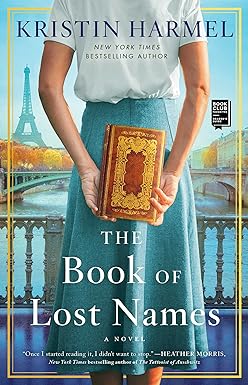Genres: Fiction, Historical
Buy on Amazon

"The Book of Lost Names" by Kristin Harmel weaves together a poignant narrative set against the backdrop of World War II, highlighting themes of identity, courage, and the enduring power of memory.
The story revolves around Eva Traube Abrams, a retired librarian in Florida, whose peaceful life is disrupted when she spots a familiar book in a newspaper photograph—The Book of Lost Names. This book triggers memories of Eva's past as a young woman in war-torn Europe during the 1940s.
As a graduate student in 1942 Paris, Eva is forced to flee to a small town in the Free Zone to escape Nazi persecution. There, she joins a clandestine effort to forge identity documents for Jewish children seeking refuge in Switzerland. Guided by a mysterious forger named Rémy, Eva discovers a deeper purpose—to preserve the real identities of these children by recording their names in The Book of Lost Names, a book crucial for reuniting families torn apart by the war.
The narrative unfolds with a dual timeline, alternating between Eva's present-day life in Florida and her perilous journey during the war. Kristin Harmel deftly explores Eva's emotional turmoil, grappling with the trauma of her past and the weight of her responsibilities. The wartime scenes are vividly portrayed, capturing the fear and desperation of those living under Nazi occupation, while also celebrating acts of resistance and bravery.
The novel's strength lies in its portrayal of Eva's moral dilemma as she risks her life to preserve the children's true identities while navigating the complexities of love and loss amidst wartime chaos. The character development is rich and nuanced, particularly Eva's growth from a timid young woman to a courageous activist driven by the need to protect others.
Harmel's prose is both evocative and gripping, transporting readers into Eva's world and capturing the essence of human resilience in the face of adversity. The historical detail is meticulously researched, offering a compelling exploration of lesser-known aspects of World War II history, such as the Nazi looting of libraries and the underground efforts to resist oppression.
Overall, "The Book of Lost Names" is a compelling and emotionally resonant novel that delves deep into the human spirit's capacity for survival and sacrifice. It is a testament to the enduring power of literature and the importance of preserving memory, even in the darkest of times. Kristin Harmel's masterful storytelling makes this novel a must-read for anyone interested in historical fiction that illuminates untold stories of courage and hope.

